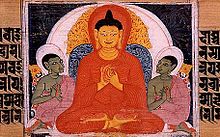You are currently logged-out. You can log-in or create an account to see more talks, save favorites, and more. more info
Four Noble Truths Talks

In Buddhism, the Four Noble Truths (Sanskrit: चत्वार्यार्यसत्यान, romanized: catvāryāryasatyāni; Pali: cattāri ariyasaccāni; "The Four arya satya") are "the truths of the noble one (the Buddha)," a statement of how things really are when they are seen correctly. The four truths are
dukkha (not being at ease, 'suffering', from dush-stha, standing unstable). Dukkha is an innate characteristic of transient existence; nothing is forever, this is painful; samudaya (origin, arising, combination; 'cause'): together with this transient world and its pain, there is also thirst (desire, longing, craving) for and attachment to this transient, unsatisfactory existence; nirodha (cessation, ending, confinement): the attachment to this transient world and its pain can be severed or contained by the confinement or letting go of this craving; marga (road, path, way): the Noble Eightfold Path is the path leading to the confinement of this desire and attachment, and the release from dukkha.The four truths appear in many grammatical forms in the ancient Buddhist texts, and are traditionally identified as the first teaching given by the Buddha. While often called one of the most important teachings in Buddhism, they have both a symbolic and a propositional function. Symbolically, they represent the awakening and liberation of the Buddha, and of the potential for his followers to reach the same liberation and freedom that he did. As propositions, the Four Truths are a conceptual framework that appear in the Pali canon and early Hybrid Sanskrit Buddhist scriptures, as a part of the broader "network of teachings" (the "dhamma matrix"), which have to be taken together. They provide a conceptual framework for introducing and explaining Buddhist thought, which has to be personally understood or "experienced".
As propositions, the four truths defy an exact definition, but refer to and express the basic orientation of Buddhism: unguarded sensory contact gives rise to craving and clinging to impermanent states and things, which are dukkha, "unsatisfactory," "incapable of satisfying" and painful. This craving keeps us caught in saṃsāra, "wandering", usually interpreted as the endless cycle of repeated rebirth, and the continued dukkha that comes with it, but also referring to the endless cycle of attraction and rejection that perpetuates the ego-mind. There is a way to end this cycle, namely by attaining nirvana, cessation of craving, whereafter rebirth and the accompanying dukkha will no longer arise again. This can be accomplished by following the eightfold path, confining our automatic responses to sensory contact by restraining oneself, cultivating discipline and wholesome states, and practicing mindfulness and dhyana (meditation).
The function of the four truths, and their importance, developed over time and the Buddhist tradition slowly recognized them as the Buddha's first teaching. This tradition was established when prajna, or "liberating insight", came to be regarded as liberating in itself, instead of or in addition to the practice of dhyana. This "liberating insight" gained a prominent place in the sutras, and the four truths came to represent this liberating insight, as a part of the enlightenment story of the Buddha.
The four truths grew to be of central importance in the Theravada tradition of Buddhism by about the 5th-century CE, which holds that the insight into the four truths is liberating in itself. They are less prominent in the Mahayana tradition, which sees the higher aims of insight into sunyata, emptiness, and following the Bodhisattva path as central elements in their teachings and practice. The Mahayana tradition reinterpreted the four truths to explain how a liberated being can still be "pervasively operative in this world". Beginning with the exploration of Buddhism by western colonialists in the 19th century and the development of Buddhist modernism, they came to be often presented in the west as the central teaching of Buddhism, sometimes with novel modernistic reinterpretations very different from the historic Buddhist traditions in Asia.
| Title | Speaker | |
|---|---|---|
Non-Thinking and the Twelve-Fold Chain of CausationSerial: SF-00968 Sunday Lecture Lotus Sutra, Instruction, Four Noble Truths, Posture, Peace, Letting Go, Separation,... |
Jul 18 2004 Green Gulch Farm |
|
Which Is The Real Seijo?Serial: SF-00967 One-day sitting lecture: when our "soul is split", what is true? Just sitting in the midst of samsara. Letting Go, Four Noble Truths, Suzuki Roshi, Big Mind, Subject-and-Object, Buddha... |
Jun 19 2004 Green Gulch Farm |
|
January Class Mindfulness, Posture, Instruction, Duality, Four Noble Truths, Four Foundations of... |
Jan 13 2004 Green Gulch Farm |
|
One-day Sitting LectureSerial: SF-01018 Lotus Sutra (Heart Sutra), seals our mind with Buddha's mind, basics of the middle way are covered (in the Sutra of Innumerable Meanings), power of joy and compassion, devotion... Lotus Sutra, First Principle, Complete Perfect Enlightenment, Nirvana, Four Noble... |
May 11 2002 Green Gulch Farm |
|
Sunday Lecture Two Truths, Four Noble Truths, Humility, Buddha Ancestors, New Year, Liberation,... |
Dec 30 2001 Green Gulch Farm |